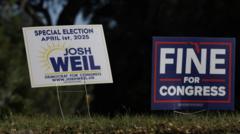**While Trump's new tariffs on foreign-made cars spark concerns among consumers and carmakers, he remains confident in their economic justification.**
**Trump Relishes Potential Price Hikes on Cars Due to New Tariffs**

**Trump Relishes Potential Price Hikes on Cars Due to New Tariffs**
**The former president expresses indifference to rising vehicle costs, emphasizing a preference for American-made products.**
In a bold statement on Saturday, former President Donald Trump asserted that he "couldn't care less" if car manufacturers increase prices in response to his newly announced 25% tariffs on foreign-made vehicles. This move, effective on April 2, has generated a mixed reaction from analysts, who warn that it could lead to temporary shutdowns in U.S. car production as increased costs ultimately trickle down to consumers.
In his interview with NBC News, Trump stated that he welcomed price hikes as they would encourage consumers to opt for American-made cars, which he claimed are abundantly available. "If you make your car in the United States, you're going to make a lot of money," he added, indicating that companies unable to comply with this shift might need to reconsider their manufacturing strategies.
Amid these developments, a CBS News poll revealed that 72% of consumers anticipate rising prices as a result of the tariffs, with many expressing dissatisfaction with the Trump administration's focus on cost reduction for American citizens. Trump's senior trade advisor, Peter Navarro, urged the public to trust the former president, citing previous tariffs on China that he argued led to economic prosperity despite potential inflation concerns, which he believes will predominantly impact foreign manufacturers.
Shawn Fain, leader of the United Auto Workers union, acknowledged the complexities of the situation; while he criticized Trump’s labor policies, he proposed that tariffs could serve as vital tools for revitalizing domestic manufacturing. This sentiment reflects growing concerns among U.S. carmakers, who previously saw a pause on the proposed tariffs following objections from major industry players like Ford and GM.
As Trump expresses a commitment to follow through with these tariffs, he hinted at a willingness to negotiate only if provided with significant advantages, hinting at a broader strategy in economic dealings. This assertive tone was mirrored in his comments regarding potential secondary tariffs on Russian oil if dialogues regarding Ukraine do not progress satisfactorily, indicating simultaneous engagement in both domestic and international economic strategies.
Trump's declarations could jeopardize relationships with several of America's key trading allies. Recent reports suggest that the UK is seeking exemptions, while countries like Germany and France have vocalized their readiness to retaliate against U.S. trade policies. Canada has described Trump's tariffs as a "direct attack," and China has accused the U.S. of contravening international trade regulations.
As discussions continue over the implications of Trump's tariffs, it remains to be seen how these decisions will shape the landscape of the automotive industry and international trade relations in the coming months.
In his interview with NBC News, Trump stated that he welcomed price hikes as they would encourage consumers to opt for American-made cars, which he claimed are abundantly available. "If you make your car in the United States, you're going to make a lot of money," he added, indicating that companies unable to comply with this shift might need to reconsider their manufacturing strategies.
Amid these developments, a CBS News poll revealed that 72% of consumers anticipate rising prices as a result of the tariffs, with many expressing dissatisfaction with the Trump administration's focus on cost reduction for American citizens. Trump's senior trade advisor, Peter Navarro, urged the public to trust the former president, citing previous tariffs on China that he argued led to economic prosperity despite potential inflation concerns, which he believes will predominantly impact foreign manufacturers.
Shawn Fain, leader of the United Auto Workers union, acknowledged the complexities of the situation; while he criticized Trump’s labor policies, he proposed that tariffs could serve as vital tools for revitalizing domestic manufacturing. This sentiment reflects growing concerns among U.S. carmakers, who previously saw a pause on the proposed tariffs following objections from major industry players like Ford and GM.
As Trump expresses a commitment to follow through with these tariffs, he hinted at a willingness to negotiate only if provided with significant advantages, hinting at a broader strategy in economic dealings. This assertive tone was mirrored in his comments regarding potential secondary tariffs on Russian oil if dialogues regarding Ukraine do not progress satisfactorily, indicating simultaneous engagement in both domestic and international economic strategies.
Trump's declarations could jeopardize relationships with several of America's key trading allies. Recent reports suggest that the UK is seeking exemptions, while countries like Germany and France have vocalized their readiness to retaliate against U.S. trade policies. Canada has described Trump's tariffs as a "direct attack," and China has accused the U.S. of contravening international trade regulations.
As discussions continue over the implications of Trump's tariffs, it remains to be seen how these decisions will shape the landscape of the automotive industry and international trade relations in the coming months.




















